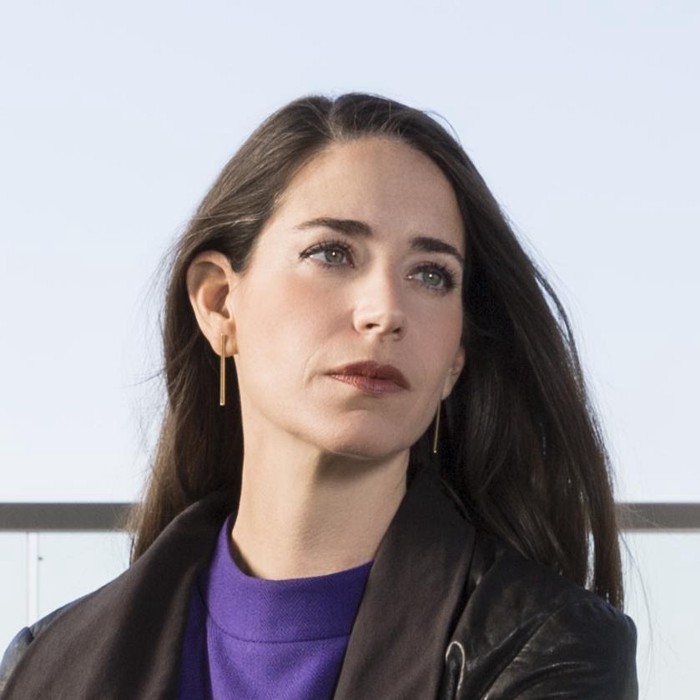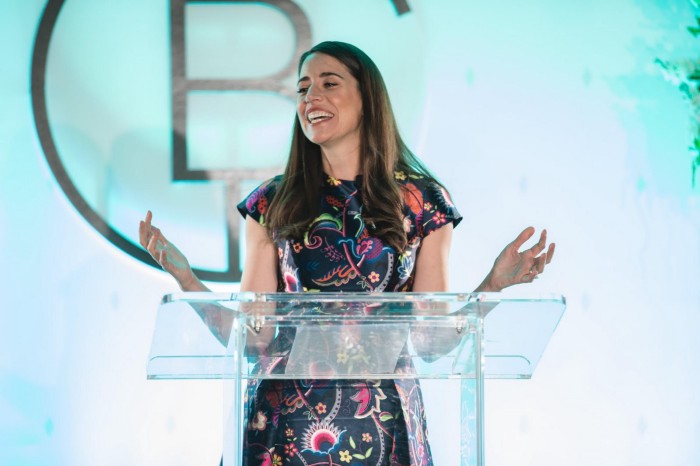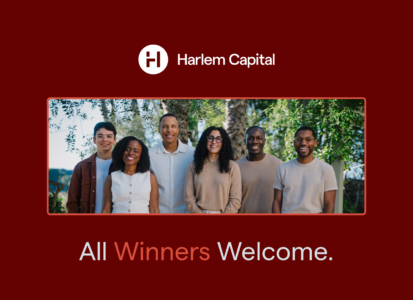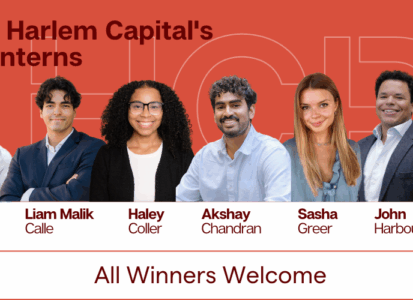More Equity Podcast: Carolyn Rodz of Hello Alice
by Harlem Capital

Part 3 of the Female Founders Series featuring Carolyn Rodz of Hello Alice
America is home to over 28 million small businesses employing 57 million workers. Large businesses may dominate the stock market, but it’s small businesses and startups that keep our economy moving. Small businesses support their local economies, keeping money close to home and providing products and services that their specific community needs. In these uncertain times, it’s more important than ever to be supporting the small businesses around us.
Carolyn Rodz, the founder & CEO of Hello Alice, is doing just that. Hello Alice is an intelligent business advisor that helps small business and startup owners grow their companies. We sat down with Carolyn to discuss her experiences as a three-time founder, Hello Alice’s response to COVID-19, and why she believes #WFH might make our lives all a little more equitable.
Interview has been condensed and edited for clarity.
To begin, I would love to hear more about the journey that led to you founding Hello Alice.
I started Hello Alice as the answer to what I wish I had when I was starting my first company fifteen years ago. I left a career in investment banking and really jumped into entrepreneurship. I had watched my grandparents run a company and my father run a business. I started in the retail industry and I really learned every lesson about my company the hard way. I had a network of bankers and the corporate world, but I didn’t have a network of entrepreneurs. There were a lot of questions I struggled with in terms of where to spend money, when I needed to make decisions about hiring, how to allocate my time — it was all really confusing, and it didn’t seem like there was a source of truth for what the next step for my business needed to be. Ultimately, that business failed. I closed after two years and started a second company, in a totally different space — partly because I realized retail wasn’t my jam and partly because I really wanted to prove to myself that I could make it as an entrepreneur. That second company I sold to one of my clients.
It wasn’t until that happened that all these opportunities started opening up to me. I kind of got in this network — I was starting to meet people, being asked to speak — I felt like this whole world was opening up to me at a time when frankly, I didn’t need it, because I had just sold my business. I realized that this would have been so helpful to me on day 1. That was the necessity that I felt to start Hello Alice — how do we open up every single entrepreneur on day 1 to the networks and opportunities they need to grow?
That’s fascinating. I think something that’s really interesting about Hello Alice is that it really makes the process of finding information to build your business more meritocratic, and I was wondering if you could speak about how you’re thinking about equity and inclusion as you’re building out Hello Alice’s offerings.
It all goes back to my own experience. I realize as privileged as I am in terms of being college educated, having a career in investment banking and the network that I started with — how difficult it still was. At the time, the startup world was very much in Silicon Valley and New York. We’ve seen it spread a lot since those years, but it’s still very siloed. Even in a city like Houston — the fourth largest city in the country — I see conversations happening with a lot of organizations focused on inclusivity happening outside of the tech and startup ecosystem. One of the things we’ve focused on is, how do we bridge those conversations between tech and all small businesses? Also, when you think about concepts like design thinking, or creating an MVP, or fundraising, or accessing capital in general, those aren’t specific to the tech industry — they’re happening across all business. For me, the biggest thing as I think about our role in all of this is, how can we have one conversation about what it takes to start and grow a company?
I love that very holistic way of thinking about inclusion. On a slightly different note, I noticed that Hello Alice recently launched a COVID-19 Business Resource Center for small businesses — very timely. I’m curious what drove the development of that initiative and what you think are some of the most critical challenges facing small businesses in light of the coronavirus.
Prior to the coronavirus, we saw consistently across every demographic and geography, access to capital as the number one need for small business owners and entrepreneurs. Not surprisingly, that’s only become more prominent as a result of COVID-19. Businesses need capital to stay alive. The conversations happening in the tech industry and small business are very much unified right now — everybody needs quick access to money just to stay alive. On our team, we’re constantly asking, how can we tactically help small business owners grow? What can we solve in a hands-on way with our corporate and government partners? Funding was at the top of that list, more than ever. That launched our grants program — we’re offering $10–50K grants to quickly help companies in times of need.
We also knew capital alone wasn’t going to solve the problem. People are also dealing with a lot of other issues — mental health, streamlining expenses — so the COVID-19 business center is a one-stop hub to sort through issues quickly and get the resources you need to grow.
That’s awesome. I think the COVID-19 resource center is a great example of how well you and your team understand small businesses and their scope and reach. I’m curious about how you got to that point. Especially at the seed stage, every startup works through the challenge of finding product market fit. Could you talk about an “aha” moment you had when you realized you had found that fit?
I think the need was always really clear, partly because I was and still am the target market. I thought about what would be helpful for me as a business owner. As we’re building, every day I do a mental check of, “would this have actually helped me?”
The “aha” moment really came years ago when we started a virtual accelerator. Very quickly, the press jumped on it and we had such an inflow of demand for what we were offering that it got overwhelming. We thought we would need to scale to hundreds of entrepreneurs, but then quickly saw that we would need to scale to reach millions. That kicked off a pivot for the business — because initially, when we were creating Hello Alice, it was about supporting female entrepreneurs specifically, who tend to be the primary caregivers in their homes and have less flexibility to pack up and move to join an accelerator. We realized the issue, however, has more to do with access to information, which impacts every underrepresented group of entrepreneurs and pivoted from supporting just women to supporting every single small business owner.
It’s very cool how the mission expanded. With that, I’d love to dive into fundraising and speak more about that part of the journey. I’m curious at what part of the process in building Hello Alice did you begin raising outside capital and was there anything specific you were looking for in your early-stage investors?
Our mission is so core to everything we do. Every time we make a hire, we make sure our values are really aligned. Elizabeth, my co-founder, and I — one of the reasons we work so well together is our values are exactly aligned. Values are also first and foremost what we look for in our investors. We have walked away from capital in times when we really needed it because there was a misalignment in values; we felt like these weren’t investors that fully believed in the mission. That’s a hard decision to make when you need money, but in hindsight, 1000% the right decision.
The other piece is, for when we decided to raise, it’s always been a race against time more than anything else. It was important for us to get a really tactical solution out there as fast as possible. We knew everybody needed it and eventually somebody was going to build it. We bootstrapped our MVP, a lot of that lived on my own credit card and expense account. Then, we brought on partners. Dell was our first partner, they gave us a pretty significant amount of funding to help build the first iteration of our technology. That really opened the door to fundraising.
Absolutely. The values piece is interesting, especially as gender-lens funds and social impact funds are taking up more and more space in the VC ecosystem, I imagine that’ll be a bigger part of a founder’s checklist as they’re raising.
We go through a similar interview process for investors as when we hire an employee, because we’re actually bringing on these investors as owners in our company. They’re going to be there forever, you’re going to engage with them forever. We have been so fortunate that our investors are one of our strongest assets. They really are part of our team. We call them all the time; share information all the time. We’re super transparent with them and it’s a really open, two-way relationship. We also look to support them however we can.
Fundraising is known to be notoriously difficult for female founders and female founders of color especially. Having gone through the fundraising process yourself, where do you think the fundraising process and VC ecosystem could improve to better address issues of racial and gender equity?
I think the hard fact is that fundraising is difficult for everybody — it doesn’t matter who you are, it’s a time-consuming and difficult process. It’s important to start there.
Where it gets particularly tough for women and people of color is the concept of the network. For Elizabeth and myself, almost all of our investors came through some sort of personal relationship. We’re fortunate that our business helps us build those relationships. We also spent a lot of time staying connected with investors after we raised capital, continuing to give updates to investors who told us no. That relationship-building piece is so critical. It’s harder when you look different, it’s harder when you live in a different city. I think that’s where women and new majority entrepreneurs have to take that extra step — you have to work twice as hard to build relationships, you have to go above and beyond in terms of delivering, you have to prove that you’re a relationship worth having. Then, that ask becomes much easier.

Yeah, that makes a lot of sense. It’s really about that personal grit and resilience. Zooming out a bit, as a prominent female leader in tech with a female co-founder, what does building a diverse team mean to you? Has your view on what diversity is evolved since you began your career in investment banking?
Diversity has always been really important to me. I started off in investment banking in a group of over 60 people and two women. As a Latina female, I see both sides of it, in terms of what cultural and gender perspectives bring to the table. When you have a homogenous group, it’s really difficult to see beyond your own world. If you’re trying to build a tech company that serves the masses, you really have to be able to see beyond your own bubble.
Certainly, I can bring the perspective of a female Latina business owner in Houston, TX, but that’s a really limited perspective of what business owners need. It helps for me to talk to people from all different perspectives all the time. We see diversity as age, gender, ethnicity, background, experiences. What does all of this mean together?
Another widely discussed issue related to diversity is motherhood. I’ve seen so many interviews with female CEOs who are also mothers, where they’re continually asked if they can have it all. Their male counterparts who are fathers wouldn’t normally be asked such questions. There’s clearly this double standard, but motherhood is obviously an important part of your entrepreneurial journey. When you speak with press, how do you navigate the tension between speaking openly about motherhood while also keeping the focus on your business?
I’m very much an open book when it comes to talking about the things that shape the way I work and what work means to me. My children are actually one of my greatest assets when it comes to my work. I have a tendency to sort of be a workaholic — I love what I do and I could do it 24/7. The one thing on this planet that I love more than my job is my family. It forces this balance for me, in terms of really having to take some white space. Plus, having kids challenges you to think in a different way — I’ve learned things from playing video games with my 8-year-old — for example, seeing how people are incentivized to do different things in a game. So whenever people ask me about motherhood I’m always happy to talk about it just because I think it’s an asset in multiple ways, the same way I think lots of our life circumstances which could be seen as obstacles challenge us to think in new and fresh ways.
On the flip side, my husband is also an entrepreneur, and I think about how unfortunate it is for him that he doesn’t get invited to bring that part of himself into the workforce as much as I do. I hope through all of this — that’s one of the silver linings to coronavirus that I see — it’s sort of stripped back this work facade that I think a lot of us have. Women probably have a little bit less of it, out of necessity, but I think men have a little bit less of it now, too. It’s funny seeing my husband with the kids in his background on his Zoom meetings. It’s made his work colleagues much more comfortable about being forthcoming about those parts of their worlds as well. The more we all start to bring that to the table, that’s when we’ll see this equity start to happen.
To close, how do you define success in your career and in your life?
I look at my whole life as a continuous journey. When I look at my failed and successful experiences, there’s not really an end and a beginning, it’s more like a notch in the path of where I’m going. People ask a lot about how you overcome failure, what success means to you, et cetera. I think it’s all part of this long, blended timeline. We’re learning every day. I don’t see success as this moment of, when I hit this milestone, everything will be better. I just want to wake up today and do a little better than I did yesterday and make a little more progress than I did yesterday, and I think it will open up great opportunities and interesting experiences. But who knows what that means in 5 or 10 years? I do know I’m never complacent — it’s just not in my nature — and so I’m always trying to push bigger and bigger boulders forward. I can’t wait to see what the next one is.
— — –
CTA (include either at end of post):
Interested in learning more about Hello Alice’s digital resource center and grant program?
In partnership with the U.S. Chamber Foundation and hundreds of entrepreneur networks and government agencies, Hello Alice’s digital resource center is designed to provide business owners and entrepreneurs with step-by-step, comprehensive access to financial support, government programs, mentors and the real-world help urgently needed at this time. Founders/Business owners can visit www.covid19businesscenter.com to apply for an emergency grant, access financial aid, search national, state, and local government programs, learn how to operate a remote team and migrate business from offline to online, receive anxiety and mental health resources, connect with a supportive community, and more.
To help owners with their cash flow needs, Hello Alice and partners the eBay Foundation and Silicon Valley Bank are proud to deploy COVID-19 Business for All Emergency Grants of $10,000 each, which are to be distributed immediately to impacted owners with 50 or less employees. In addition to funding, grant recipients will receive ongoing support from the Hello Alice community and their partners, such as Amazon Web Services and Verizon. Owners can complete a grant application at the resource center website.
Follow Carolyn and Hello Alice:
Twitter — @carolynrodz @HelloAlice
Instagram — @carolynrodz @helloalice_com


